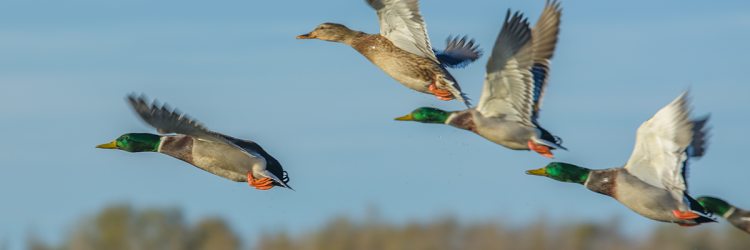Biologists continue to monitor avian influenza across Florida
Florida Fish and Wildlife Conservation Commission (FWC)
The Florida Fish and Wildlife Conservation Commission (FWC) continues to monitor bird mortalities suspected to be attributed to Highly Pathogenic Avian Influenza (HPAI) throughout Florida. This strain has been documented in the United States since 2021, and was detected for the first time in Florida in January 2022.
The FWC has documented the virus in 37 counties, and a variety of bird species. The most common species affected in Florida include black vultures, lesser scaup, and Muscovy ducks. Owls, bald eagles and other raptors, along with aquatic birds and waterfowl, have also been affected.
There is a low risk of HPAI transmission to humans, which can be minimized by following basic safety protocols. To prevent the spread of HPAI, the public should avoid handling sick or dead wildlife, prevent the contact of domestic birds with wild birds, and report wild bird mortalities to the FWC at app.myfwc.com/FWRI/AvianMortality. Domestic poultry mortality should be reported to the Florida Department of Agriculture & Consumer Services at www.fdacs.gov/Consumer-Resources/Animals/Animal-Diseases/Avian-Influenza.
Precautions for hunters, the general public and wildlife rehabbers can be found at MyFWC.com/AvianInfluenza.
Because HPAI is not treatable and is easily transmitted in wild birds, some wildlife rehabbers may not accept these animals. Information regarding carcass disposal is available through the Florida Department of Agriculture & Consumer Services. Visit www.fdacs.gov or call 1 800 HELP FLA (1-800-435-7352) or 1 800 FL AYUDA (1-800-352-9832). Their services are available Monday-Friday, 8:00 a.m. to 5:00 p.m. EST.
To study mortality events involving wild birds, the FWC is working closely with the United States Department of Agriculture-Wildlife Services, Florida Department of Agriculture and Consumer Services, University of Florida, National Wildlife Health Center, Southeastern Cooperative Wildlife Disease Study, Florida Department of Health and wildlife rehabilitators
ADDITIONAL RESOURCES:
• Florida Fish and Wildlife Conservation Commission:
MyFWC.com/AvianInfluenza
• Florida Department of Health:
FloridaHealth.gov/diseases-and-conditions/influenza/index.html
• Florida Department of Agriculture and Consumer Services:
fdacs.gov/Consumer-Resources/Animals/Animal-Diseases/Avian-Influenza
• USDA Highly Pathogenic Avian Influenza in Mammals:
https://www.aphis.usda.gov/aphis/ourfocus/animalhealth/animal-disease-information/avian/avian-influenza/hpai-2022/2022-hpai-wild-birds
• USDA Defend the Flock Program:
https://www.aphis.usda.gov/aphis/ourfocus/animalhealth/animal-disease-information/avian/defend-the-flock-program
Top
The Florida Fish and Wildlife Conservation Commission (FWC) continues to monitor bird mortalities suspected to be attributed to Highly Pathogenic Avian Influenza (HPAI) throughout Florida. This strain has been documented in the United States since 2021, and was detected for the first time in Florida in January 2022.
The FWC has documented the virus in 37 counties, and a variety of bird species. The most common species affected in Florida include black vultures, lesser scaup, and Muscovy ducks. Owls, bald eagles and other raptors, along with aquatic birds and waterfowl, have also been affected.
There is a low risk of HPAI transmission to humans, which can be minimized by following basic safety protocols. To prevent the spread of HPAI, the public should avoid handling sick or dead wildlife, prevent the contact of domestic birds with wild birds, and report wild bird mortalities to the FWC at app.myfwc.com/FWRI/AvianMortality. Domestic poultry mortality should be reported to the Florida Department of Agriculture & Consumer Services at www.fdacs.gov/Consumer-Resources/Animals/Animal-Diseases/Avian-Influenza.
Precautions for hunters, the general public and wildlife rehabbers can be found at MyFWC.com/AvianInfluenza.
Because HPAI is not treatable and is easily transmitted in wild birds, some wildlife rehabbers may not accept these animals. Information regarding carcass disposal is available through the Florida Department of Agriculture & Consumer Services. Visit www.fdacs.gov or call 1 800 HELP FLA (1-800-435-7352) or 1 800 FL AYUDA (1-800-352-9832). Their services are available Monday-Friday, 8:00 a.m. to 5:00 p.m. EST.
To study mortality events involving wild birds, the FWC is working closely with the United States Department of Agriculture-Wildlife Services, Florida Department of Agriculture and Consumer Services, University of Florida, National Wildlife Health Center, Southeastern Cooperative Wildlife Disease Study, Florida Department of Health and wildlife rehabilitators
ADDITIONAL RESOURCES:
• Florida Fish and Wildlife Conservation Commission:
MyFWC.com/AvianInfluenza
• Florida Department of Health:
FloridaHealth.gov/diseases-and-conditions/influenza/index.html
• Florida Department of Agriculture and Consumer Services:
fdacs.gov/Consumer-Resources/Animals/Animal-Diseases/Avian-Influenza
• USDA Highly Pathogenic Avian Influenza in Mammals:
https://www.aphis.usda.gov/aphis/ourfocus/animalhealth/animal-disease-information/avian/avian-influenza/hpai-2022/2022-hpai-wild-birds
• USDA Defend the Flock Program:
https://www.aphis.usda.gov/aphis/ourfocus/animalhealth/animal-disease-information/avian/defend-the-flock-program
